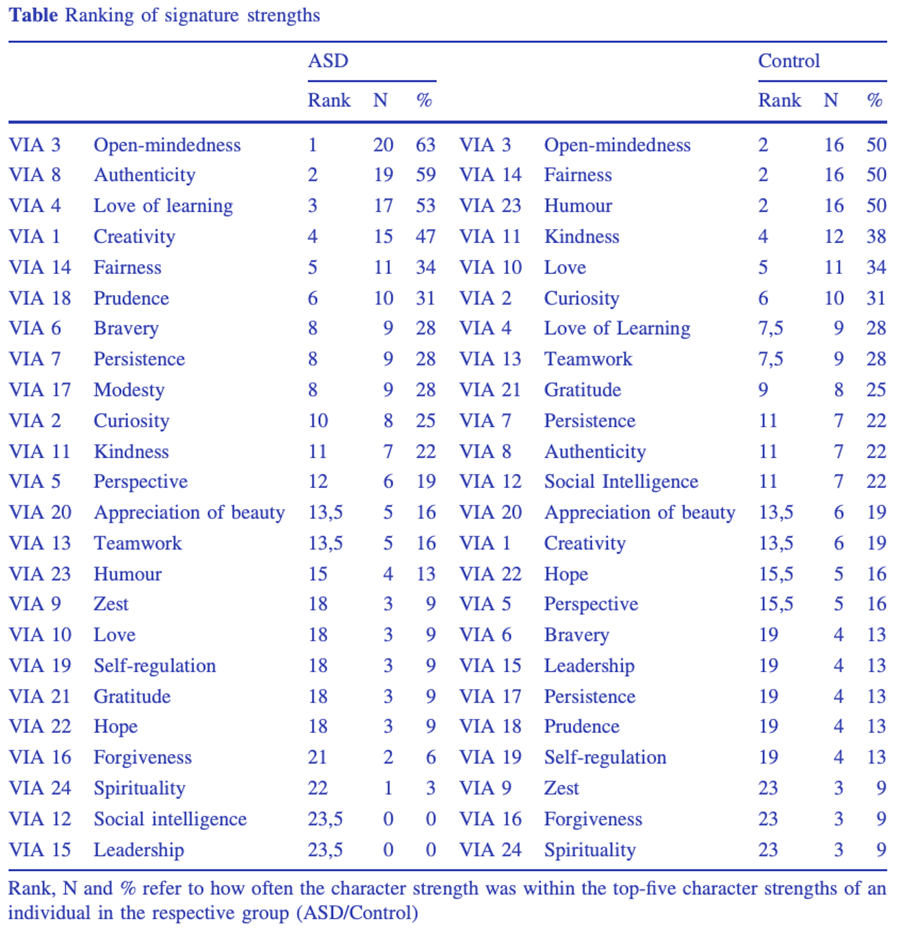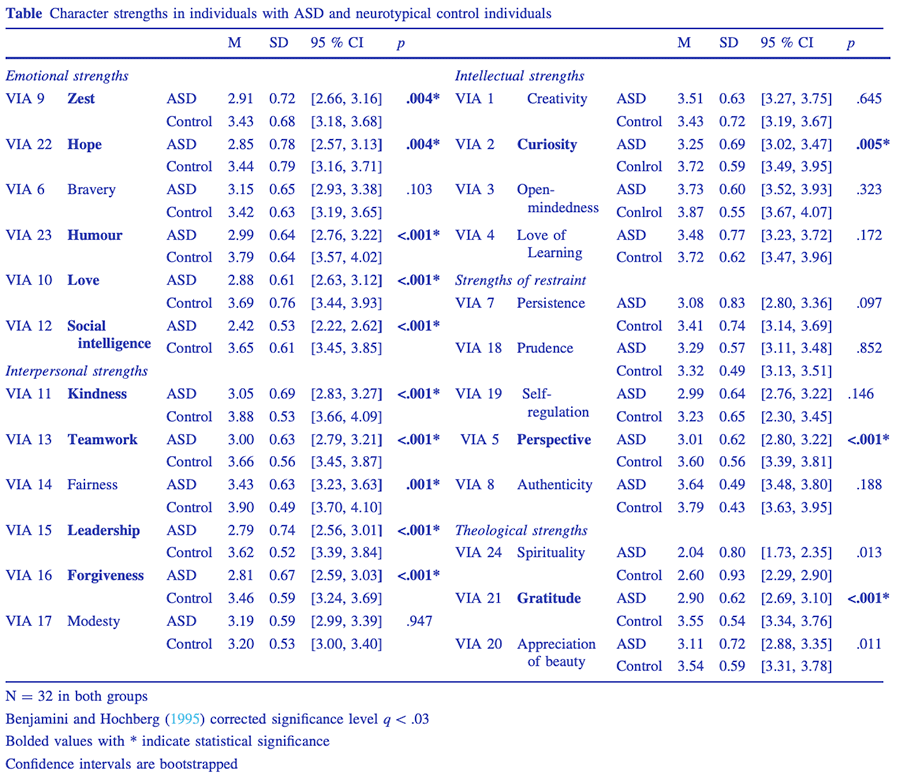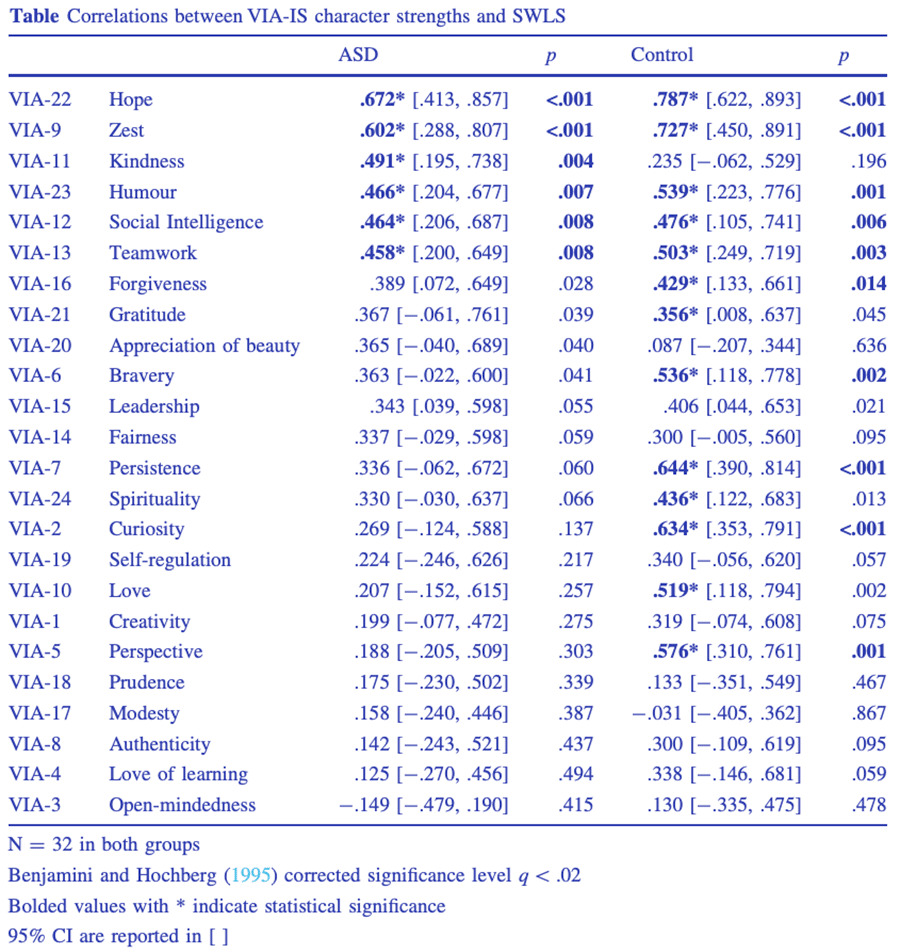The VIA Inventory of Strengths (VIA or VIA-IS for short) is a self-administered, scientifically validated questionnaire that provides a rank order of an adult’s 24 character strengths and virtues.
Basic information |
|
|---|---|
| Statements: | 96 |
| Duration: | 10–15 minutes |
| Type: | Screening tool & psychological assessment |
| Authors: | Christopher Peterson & Martin Seligman |
| Publishing year: | 2004 |
| Seminal book: | Character strengths and virtues: A handbook and classification (2004) |
Take the test here:
Note that you need to create an account to participate in the free survey. With your account, you can save your progress and access your Character Strengths profile at a later point. According to the VIA website, your results are private and confidential.
What it tests
The VIA classification is not a taxonomy of strengths (since taxonomies require an underlying deep theory explaining multiple relationships between constructs), but a “classification”—a conceptual scheme that is holistic. The framework offers the following strengths:[1]Character Strengths and Virtues: A Handbook and Classification | VIA Institute on character
- Cognitive strengths (called the Virtue of Wisdom in the VIA)
- Emotional strengths (called the Virtue of Courage)
- Social & community strengths (called the Virtue of Humanity & Virtue of Justice)
- Protective strengths (called the Virtue of Temperance)
- Spiritual strengths (called the Virtue of Transcendence)
Who the test is designed for
- Adults (age 18+) of average or higher intelligence.[2]Take survey | VIA Institute on character
Although the VIA has been used for research,[3]Research findings | VIA Institute on character it’s particularly suited to clinical work and can be used to:[4]VIA-IS | PsychTools
- Identify client strengths
- Inform therapeutic interventions
- Bolster self-esteem
- Build resilience
- Strengthen the therapeutic relationship
- Empower the client
Versions & translations
- The VIA-IS is available in most languages
- Non-adults versions are also available: Ages 8–17 (you will need to create an account)
Taking the test
The test asks that you choose one option in response to each statement. The challenge for autistics is words like always and never, which, when taken literally, mean if we can think of a single exception, we will not answer in a nuanced way—a requirement of the test.
The VIA-IS-P-96 consists of 96 statements, giving you 5 choices for each statement:
- Very Much Like Me
- Like Me
- Neutral
- Unlike Me
- Not at all like me
Note: If you decide to take the test, please don’t take absolute words such as always and never too literally, as these questions are asking about your general tendency. Read the definitions of terms such as bravery and zest from the list in scoring rather than dictionary definitions, to avoid confusion.
Scoring
On the VIA, you don’t get any scores, but rather a ranking of your 24 Character Strengths, from strongest to weakest. See the Character Strengths below for a list of the test items.
Character Strengths
In the table below, you can see a listing of the strengths, with short descriptions of each item.[5]Values in Action Inventory of Strengths (VIA-IS) (Ruch et al., 2010)[6]Testing Strengths-Based Interventions: A Preliminary Study on the Effectiveness of a Program Targeting Curiosity, Gratitude, Hope, Humor, and Zest for Enhancing Life Satisfaction (Proyer, Ruch & Buschor, 2012)
VIA Inventory of Strengths
© Copyright 2004–2023, VIA Institute on Character. All rights reserved. Used with permission.
In the table below, you can see a listing of the strengths and the categories they belong to.[7]Values in Action Inventory of Strengths (VIA-IS) (Ruch et al., 2010)[8]Testing Strengths-Based Interventions: A Preliminary Study on the Effectiveness of a Program Targeting Curiosity, Gratitude, Hope, Humor, and Zest for Enhancing Life Satisfaction (Proyer, Ruch & Buschor, 2012)
VIA Inventory of Strengths
© Copyright 2004–2023, VIA Institute on Character. All rights reserved. Used with permission.
Validity
How reliable, accurate, valid, and up to date is the test?
The VIA-IS is consistent with what people consider to be their strengths. Research shows its results are in agreement with other Strengths personality tests.
Test–retest consistency is good. Finally, it demonstrates its validity across numerous cultures.
Character strengths in autism
Research from 2016 indicates that the most frequently endorsed signature strengths in the autism group were (the following) intellectual strengths:[9]Brief Report: Character Strengths in Adults with Autism Spectrum Disorder Without Intellectual Impairment (Kirchner, Ruch & Dziobek, 2016)
Whereas in the control group (neurotypicals), the most frequently endorsed signature strengths were emotional and interpersonal strengths:[10]Brief Report: Character Strengths in Adults with Autism Spectrum Disorder Without Intellectual Impairment (Kirchner, Ruch & Dziobek, 2016)
In the table below, you can see a ranking of how autistic people and neurotypicals scored on the VIA character strengths.[11]Brief Report: Character Strengths in Adults with Autism Spectrum Disorder Without Intellectual Impairment (Kirchner, Ruch & Dziobek, 2016)

And for those interested, in the table below you can see the correlations of the character strengths with autism and neurotypicality, with the statistically significant correlations set in bold.[12]Brief Report: Character Strengths in Adults with Autism Spectrum Disorder Without Intellectual Impairment (Kirchner, Ruch & Dziobek, 2016)

Research from 2017 confirmed that the signature strengths profile of the autistic group comprises mainly intellectual strengths.[13]Towards a resource-oriented approach in autism research: Strengths related to personality and special interests in high-functioning individuals on the autism-spectrum (Kirchner, 2017)
Satisfaction with life
The researchers also looked into which strengths are associated with Satisfaction With Life Scale (SWLS). For autistic people, the highest positive associations were:[14]Brief Report: Character Strengths in Adults with Autism Spectrum Disorder Without Intellectual Impairment (Kirchner, Ruch & Dziobek, 2016)
- Kindness (interpersonal)
- Social intelligence (emotional)
- Teamwork (interpersonal)
- Humour (emotional)
Research from 2017 also echo these findings.[15]Towards a resource-oriented approach in autism research: Strengths related to personality and special interests in high-functioning individuals on the autism-spectrum (Kirchner, 2017) Whereas the highest positive associations with SWL in the neurotypical group were:[16]Brief Report: Character Strengths in Adults with Autism Spectrum Disorder Without Intellectual Impairment (Kirchner, Ruch & Dziobek, 2016)
- Perseverance (restraint)
- Curiosity (intellectual)
- Perspective (restraint)
- Humour (emotional)
In the table below, you can see the correlations between the character strengths and the SWLS, with the values in bold indicating statistical significance.[17]Brief Report: Character Strengths in Adults with Autism Spectrum Disorder Without Intellectual Impairment (Kirchner, Ruch & Dziobek, 2016)

Research from 2013 also showed that:[18]Humor as character strength and its relation to life satisfaction and happiness in Autism Spectrum Disorders (Samson & Antonelli, 2013)
- In neurotypicals, humor is related to life of pleasure, life of engagement, life of meaning, and life satisfaction.
- In autistics, humor is only related to life of pleasure.
This seems to suggest that for autistic people, humor does not seem to contribute to life satisfaction to the same degree as in neurotypicals.
Discussion
Natalie:
- This is one of my all-time favourite tests, with good reason. Research shows that people who use their strengths are 18 times more likely to flourish in their lives than those who don’t![19]Brief Report: Character Strengths in Adults with Autism Spectrum Disorder Without Intellectual Impairment (Kirchner, Ruch & Dziobek, 2016) Also, I like the VIA-IS for its utility in therapy, and for bringing insights and empowerment to clients.
- Interpersonal and emotional strengths have the highest positive associations with life satisfaction in autistics.[20]Brief Report: Character Strengths in Adults with Autism Spectrum Disorder Without Intellectual Impairment (Kirchner, Ruch & Dziobek, 2016) Kindness and Fairness are high for me, and I have a very happy life.
Kendall:
- Simply omitting the words always and never would make my answers much easier to negotiate. Their use in statement wording consistently excludes a very much like me, very much unlike me response, and often force a neutral answer. While the resulting scale is skewed in some respects, I feel it’s accurate overall. Since the results are generally what I consider my strengths, their usefulness would appear to concern others rather than me personally.
Recommended next steps
After the VIA, consider taking one of the tests below.
Autism Spectrum Quotient
A simple screening test that is used
as a basis for pursuing a formal autism evaluation
Aspie Quiz
Identifies neurodivergence and
potential co-occurring conditions
Systemizing Quotient
Measures your systemizing and pattern
finding proclivities and abilities
Online autism tests can play an essential role in the process of self-discovery, and may inform your decision to pursue a formal diagnosis. For a formal assessment, please see a knowledgeable medical professional trained in assessing autism.
If you are looking for an autism assessment,
Dr. Natalie Engelbrecht can offer help!
You can find more information here:
Comments
Let us know what you think!